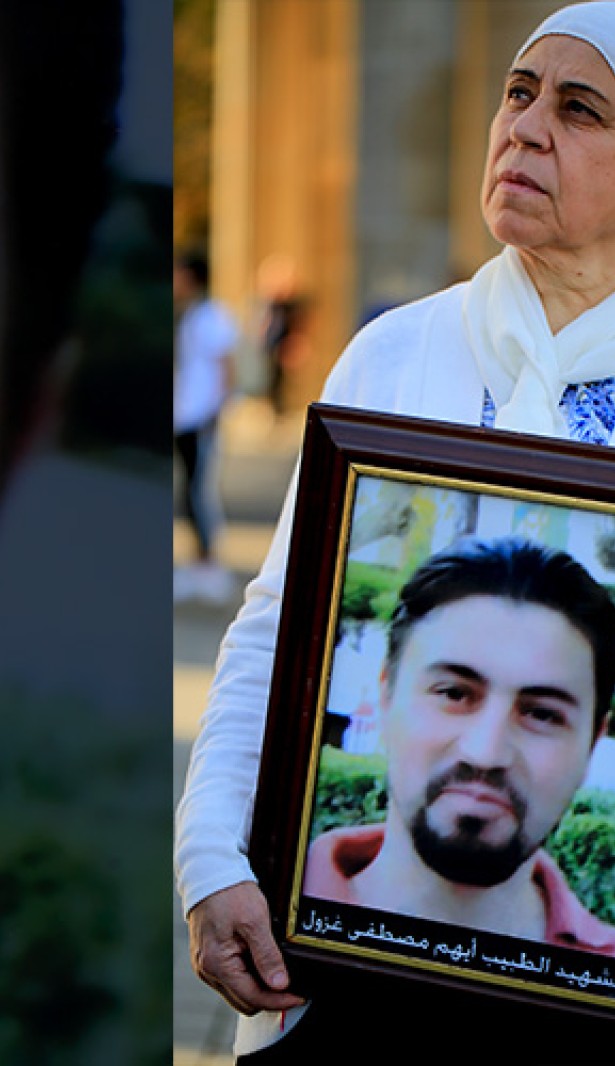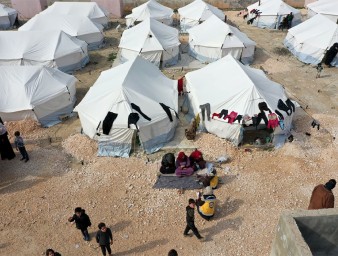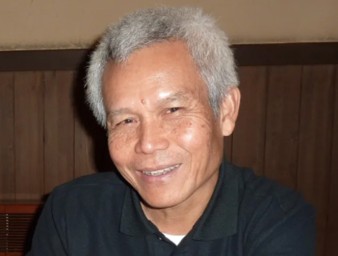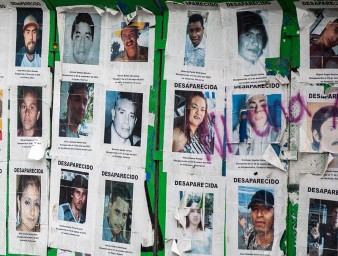Syria’s missing: the search for truth, justice and reparation
11 March 2021
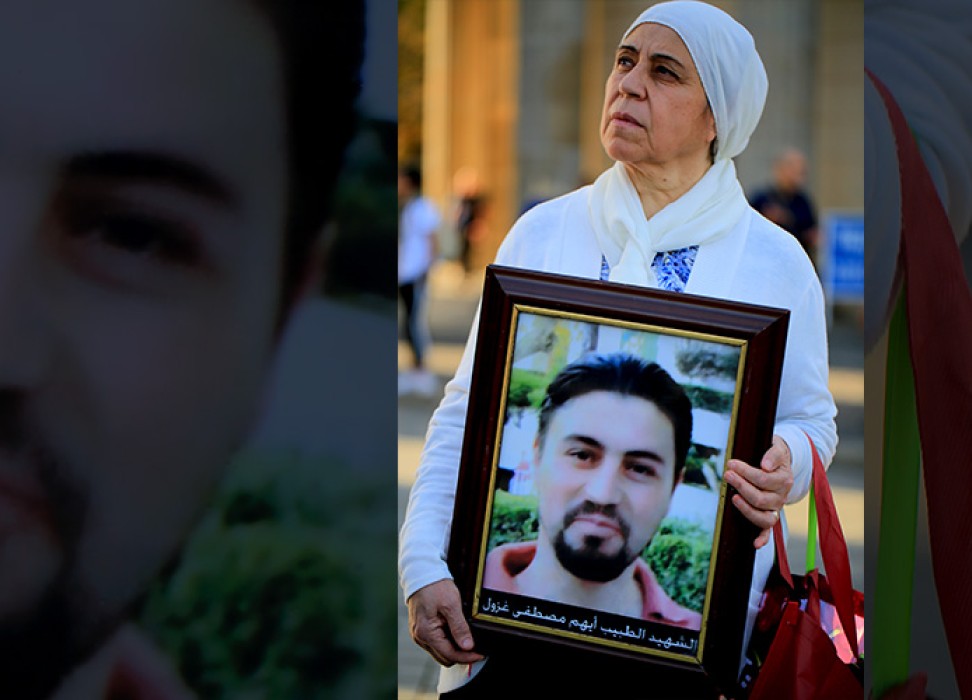
The families of the tens of thousands of people forcibly disappeared in Syria are demanding answers. Two women tell their stories.
“He was a real source of joy for the family. He was always happy.”
Since 2012, Meriem Hallaq has been living a nightmare: that year, her son, Ayham had been arrested and detained for peaceful protest against the Syrian government. She recalls the moment when, walking past the door of a room in her family home where Ayham spent most of his time, she had a sudden, sickening feeling as if someone was throwing his body in front of her.
Although Meriem tried to dismiss her instinct for the worst-case scenario, she found out three months later that she was right.
Meriem lost Ayham to the violent scourges of what would become the Syrian war. Her story resembles the tragedies of thousands of others who have lost their loved ones to enforced disappearances, detention, torture or killing amidst the nine-year long, ongoing and bloody conflict.
Ayham, a dentist, had become involved in peaceful protests in 2011, when the war began. He was 24. He documented human rights violations carried out by the government, and even contributed to the creation of an organisation dedicated solely to this, the Violation Documentation Centre. His work had led to his arrest and torture on one occasion prior to his second detention and his death.
Ayham passed away on 11 November 2012. He had been severely beaten and tortured.
“I never received his body, I never received his belongings,” said Meriem. “The only thing I have from him is a death certificate.”
Searching for the truth
While the exact number is unknown, at least tens of thousands of Syrian men, women and children have been forcibly disappeared, detained, abducted or gone missing at the hands of the government, armed opposition groups and terror groups operating in Syria since the outbreak of conflict in 2011.
Like Meriem, many families have confirmed information that their loved ones have lost their lives, but thousands of others remain in limbo, living in fear and uncertainty and not knowing if their relatives will ever return.
The UN Human Rights Office for Syria is working with victims’ families and local organisations focused on the issue of unlawful detention to support them in bringing their voices to international fora. In particular, the Office is assisting families to better engage with, and bring cases to the attention of international human rights mechanisms such as the UN Working Group on Enforced or Involuntary Disappearances, a Human Rights Council body that serves to determine the fate or whereabouts of the missing.
“The crime of enforced disappearance has a far-reaching impact on the human rights of not only the individuals who went missing, but their loved ones as well,” explains Dimiter Chalev, head of the UN Human Rights Office for Syria. “Those who have been subject to enforced disappearances are essentially deprived of all of their rights including the rights to fair trial and due process of law, while their relatives endure persistent violations of their rights, ranging from undefined legal personal status, discrimination and social stigma, to the rights to an adequate standard of living and education.”
To help families cope on a daily basis, UN Human Rights staff are also supporting them to seek psychosocial support, as well as legal aid, and in the longer term, helping them build strategies to make public claims for their rights to truth, to justice, and to reparation.
“We kept hope, especially in those first days”
Hiba Alhamed is a 26-year-old Syrian refugee, living in France. Her father, Ismail, went missing in 2013.
“For me, my father is the kindest person that I have ever met in my life,” says Hiba. “He cares so much about others, about his family. He’s such an idol for us.”
A surgeon, Ismail had been working in Saudi Arabia when conflict broke out in 2011 in Syria. He immediately returned to his country to participate in the peaceful protest movement and to carry out humanitarian work. Says Hiba, her father has a strong commitment to human rights, and for fighting against injustice.
He was kidnapped in ISIL-controlled Raqqa, in northeastern Syria, on his way to work. Hiba was in Aleppo at the time, and first heard the news on social media.
“From that moment, our struggle to know where he is began,” she said. “We kept hope, especially in those first days. We thought that he was taken by mistake, and that he would come back soon.”
Hiba’s mother stayed in Raqqa, doing everything she could to locate her husband and bring him home. For one year, she tried everything, including reaching contacts in the highest ranks of ISIL. But after one year of failed attempts, and facing too many dangers herself, she fled Syria with her five children.
The family ended up in Marseilles, France, where they still live today as refugees. Their search for Ismail continues every day.
“Over the last seven years, we have heard a lot of information on his supposed whereabouts, but we can’t be sure of anything,” says Hiba. “The last we heard was that they had moved prisoners, including my father, to a city on the Syria-Iraq border, but we still don’t know if that is true.”
Speaking out to find justice
Solidarity with other people who have lost family members to disappearance or death amidst the Syrian war is helping many – such as Meriem and Hiba - to find a path to justice. Over the last few years, Syrian victims’ networks and family associations in Syria and across the world have become increasingly organized to speak out on the human rights violations committed by all parties in the Syrian conflict, and to demand truth and justice.
Both Meriem and Hiba have been instrumental in building such organisations, gathering people together who are suffering an all too similar pain.
Both of their organisations have been involved in the recent launch of the Truth and Justice Charter, setting out a common vision to advance victims’ rights, search for truth and justice, and hold perpetrators accountable.
The Caesar Families Association, of which Meriem is a member, is a group of families who lost their loved ones under torture in Syrian government prisons. The group came together after identifying their family members through the famous ‘Caesar Photos,’ images leaked from within detention centres, which became public in 2014.
“We are trying to reach the international fora in any way possible,” says Meriem. “We are not just narrating stories. We are witnesses to these crimes. We know who is responsible.”
Although Meriem is disappointed in the response from many countries, who despite having evidence “have done nothing,” she is determined to persist.
“We believe that every drop of water that falls on a rock will eventually form a hole. Achieving justice will need a long time, but it will be served. And we will keep shouting because our voice is the only thing that we have.”
Hiba feels a similar struggle in seeking action from governments for the disappeared, yet nonetheless continues her fight. She is a founding member of the Coalition of Families of Persons Kidnapped by ISIL, an organisation formed in 2019 to search for the missing.
“If we don't come together as families, if we don't bear this cause or if we don't push for it, no one will do it for us,” she says.
For Hiba, her father and his friends, who stood up against ISIL and against the government, are the “real heroes.”
“I’m so proud of him, even if it has caused me a lot of pain,” she continues. “I don’t question why he did this, because it’s my dad. He and his friends have paid such a big price. But for our lives to continue, and for them, we need to know their fate.”
11 March 2021
